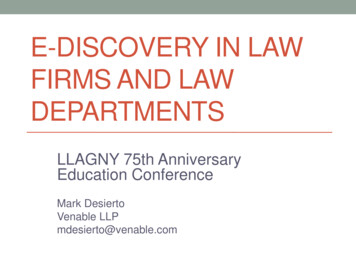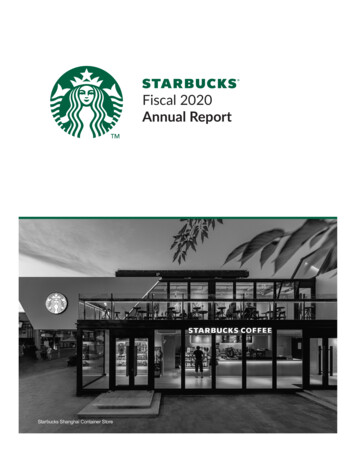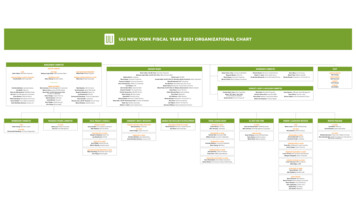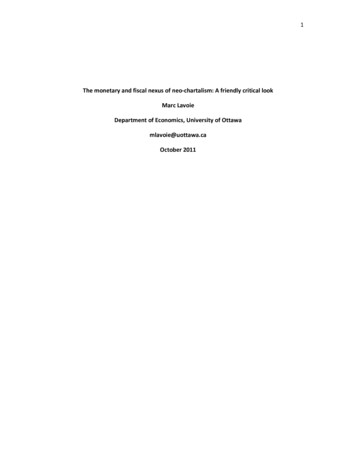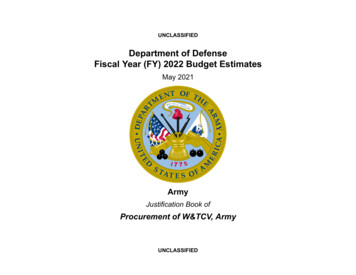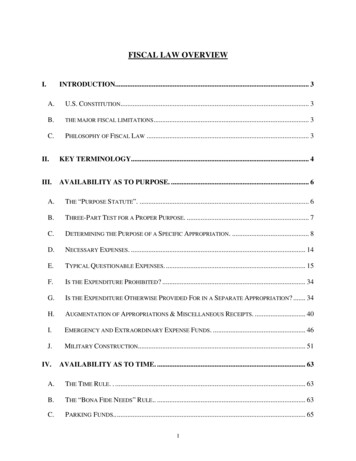
Transcription
FISCAL LAW OVERVIEWI.INTRODUCTION. 3A.U.S. CONSTITUTION. 3B.THE MAJOR FISCAL LIMITATIONS . 3C.PHILOSOPHY OF FISCAL LAW . 3II.KEY TERMINOLOGY. 4III.AVAILABILITY AS TO PURPOSE. . 6A.THE “PURPOSE STATUTE”. . 6B.THREE-PART TEST FOR A PROPER PURPOSE. . 7C.DETERMINING THE PURPOSE OF A SPECIFIC APPROPRIATION. . 8D.NECESSARY EXPENSES. . 14E.TYPICAL QUESTIONABLE EXPENSES. . 15F.IS THE EXPENDITURE PROHIBITED? . 34G.IS THE EXPENDITURE OTHERWISE PROVIDED FOR IN A SEPARATE APPROPRIATION? . 34H.AUGMENTATION OF APPROPRIATIONS & MISCELLANEOUS RECEIPTS. . 40I.EMERGENCY AND EXTRAORDINARY EXPENSE FUNDS. . 46J.MILITARY CONSTRUCTION. 51IV.AVAILABILITY AS TO TIME. . 63A.THE TIME RULE. . . 63B.THE “BONA FIDE NEEDS” RULE. . 63C.PARKING FUNDS. . 651
V.AVAILABILITY AS TO AMOUNT. . 67A.ADMINISTRATIVE SUBDIVISION OF FUNDS. . 67B.REGULATIONS TO CONTROL THE RATE OF OBLIGATIONS . . 67VI.THE ANTIDEFICIENCY ACT. . 67A.PROHIBITIONS. . 67B.ANTIDEFICIENCY ISSUES WITH P-T-A. 68C.LIMITATION ON VOLUNTARY SERVICES. . . 70D.INVESTIGATING AND REPORTING ADA VIOLATIONS. . 72VII. CONCLUSION. . 722
FISCAL LAW OVERVIEWI.INTRODUCTION.A.B.C.The U.S. Constitution gives Congress the authority to raise revenue, borrowfunds, and appropriate the proceeds for federal agencies. See U.S. Constitution,Art. I, §§ 8 and 9. In implementing these express constitutional powers, Congresslimits strictly the obligation and expenditure of public funds by the ExecutiveBranch. Congress regulates virtually all Executive Branch programs andactivities through the appropriations process.1.Congress has enacted fiscal controls, which, if violated, subject theoffender to serious adverse personnel actions and possible criminalpenalties.2.Congress and the Department of Defense (DoD) have agreed informally toadditional restrictions. The DoD refrains from taking certain actionswithout first giving prior notice to, and receiving consent from, Congress.These restraints are embodied in regulation or instituted through historicalpractice.What are the major fiscal limitations?1.An agency may obligate and expend appropriations only for a properpurpose;2.An agency may obligate only within the time limits applicable to theappropriation (e.g., O&M funds are available for obligation for one fiscalyear); and3.An agency may not obligate more than the amount appropriated by theCongress.Philosophy of Fiscal Law. “The established rule is that the expenditure of publicfunds is proper only when authorized by Congress, not that public funds may beexpended unless prohibited by Congress.” United States v. MacCollom, 426 U.S.317, 321 (1976).Fiscal Law OverviewEthics Counselor's DeskbookNovember 20133
II.KEY TERMINOLOGY.A.Fiscal Year. The Federal Government’s fiscal year begins on 1 October and endson 30 September.B.Period of Availability. The period of time in which budget authority is availablefor original obligation. Most appropriations are available for obligation for alimited period of time. If activities do not obligate the funds during the period ofavailability, the funds expire and are generally unavailable for obligationthereafter. GAO Red Book, Vol. I, p 5-3, GAO-04-261SP (Jan. 2004).C.Obligations. A definite commitment that creates a legal liability of thegovernment for the payment of goods and services ordered or received, or a legalduty on the part of the United States that could mature into a legal liability byvirtue of actions on the part of the other party beyond the control of the UnitedStates. Payment may be made immediately or in the future. An agency incurs anobligation, for example, when it places an order, signs a contract, awards a grant,purchases a service, or takes other actions that require the government to makepayments to the public or from one government account to another. The standardsfor the proper reporting of obligations are found in section 1501(a) of title 31 ofthe United States Code. GAO, A Glossary of Terms Used in the FederalBudget Process, p.70, GAO-05-734SP (Sept. 2005) (“GAO Glossary”).D.Budget Authority.1.Congress finances federal programs and activities by granting budgetauthority. Budget authority is also called obligational authority.2.Budget authority means “the authority provided by Federal law to incurfinancial obligations . . .” 2 U.S.C. § 622(2).3.“Contract Authority,” is a limited form of “budget authority.” Contractauthority is specific statutory authority to contractually obligate the UnitedStates to future payments even though no appropriations are available topay the obligations at the time the contract is made. Hon. Alan Cranston,1990 WL 10007871, at *3, Comp. Gen. No. B-239435 (Aug. 24, 1990).An example of such statutory authority is the Feed and Forage Act, 41U.S.C. § 11.Fiscal Law OverviewEthics Counselor's DeskbookNovember 20134
E.Comptroller General and Government Accountability Office (GAO).1.The Comptroller General of the United States heads the GAO, aninvestigative arm of Congress charged with examining all matters relatingto the receipt, disbursement, and use of public funds. Established by theBudget and Accounting Act of 1921 (31 U.S.C. §§ 701, et seq.) the GAOaudits government agencies.2.The Comptroller General has the authority to issue advance decisionsregarding the propriety of payments that a disbursing official or head of anagency will make or a voucher presented to a certifying official forcertification, except in those instances described in paragraph 3 below (see31 U.S.C. § 3529), BUT DoD policy is to resolve legal issues internally.DoD agencies are the military departments are prohibited from requestingadvance decisions from the Comptroller General without prior approval ofthe agency’s General Counsel and the DoD General Counsel. Financeofficers should direct their questions through channels to the appropriateGeneral Counsel’s office for an advance decision. It is DoD policy not toseek to recover a payment from an accountable official if that individualhas obtained from the General Counsel concerned an opinion advising thatthe payment could legally be made. DOD FMR, Vol. 5, Ch. 25, ¶ 2503(December 2010); 31 U.S.C. § 3527(b).3.Agency Advance Decisions. See DOD FMR, Vol. 5, Ch. 25, ¶ 2503 andVol. 5, (December 2010 ); Transfer of Claims Settlement and RelatedAdvance, Comp. Gen. No. B-275605 (Mar. 17, 1997). Per the GeneralAccounting Office Act of 1996 (Pub. L. 104-316, § 204, 110 Stat. 3826(1996) (codified at 31 U.S.C. § 3529)) and, as delegated by the Director,Office of Management and Budget (OMB), the following issue advancedecisions for designated categories:a.DoD: uniformed service member pay, allowances, travel,transportation, and survivor benefits.b.Office of Personnel Management (OPM): civilian pay and leave.Fiscal Law OverviewEthics Counselor's DeskbookNovember 20135
4.F.G.GAO Treatises. The GAO has published a five-volume treatise entitledPrinciples of Federal Appropriations Law (commonly referred to as the“GAO Red Book”) available at http://www.gao.gov/.Accounting Classifications. See DFAS-IN Reg. 37-100-XX, The ArmyManagement Structure.1.These are codes used to manage appropriations. They implement theadministrative fund control system and help to ensure correct use.2.An accounting classification is commonly referred to as a fund cite.DFAS-IN Reg. 37-100-XX, The Army Management Structure, provides adetailed breakdown of Army accounting classifications and is available fficeCode 1200Understanding an Accounting Classification. The following is a sample fund cite:21 52020 67 1234 P7200002610S18001AGENCYFISCAL YEARTYPE OF APPROPRIATIONOPERATING AGENCY CODEALLOTMENT NUMBERPROGRAM ELEMENTELEMENT OF EXPENSEFISCAL STATION NUMBERThe first two digits represent the military department. The “21” in the example showndenotes the Department of the Army.III.AVAILABILITY AS TO PURPOSE.A.The “Purpose Statute” provides that agencies shall apply appropriations only tothe objects for which the appropriations were made, except as otherwise providedby law. 31 U.S.C. § 1301(a).Fiscal Law OverviewEthics Counselor's DeskbookNovember 20136
B.Three-Part Test for a Proper Purpose. The Comptroller General has determinedthe following three conditions must be met in order to expend appropriated funds:1.The expenditure of an appropriation must be for a particular statutorypurpose, or necessary and incident to the proper execution of the generalpurpose of the appropriation.2.The expenditure must not be prohibited by law.3.The expenditure must not be otherwise provided for; it must not fall withinthe scope of some other appropriation.See e.g., Mr. Stephen M. Bodolay, 1996 WL 112423, at 1, Comp. Gen. No. B240365.2 (March 14, 1996); Hon. Bill Alexander, 63 Comp. Gen. 422, 427-428(1984); Secretary of Interior, 34 Comp. Gen. 195, 196 (1954).Fiscal Law OverviewEthics Counselor's DeskbookNovember 20137
C.Determining the Purpose of a Specific Appropriation.1.2.Appropriations Acts.a.An appropriation is a statutory authorization “to incur obligationsand make payments out of the Treasury for specified purposes.”See GAO Glossary, p.13, GAO-05-734SP (Sept. 2005).b.At the present time there are thirteen (13) regular annualappropriations acts. Some of these acts provide appropriations to asingle agency, while others provide appropriations to multipleagencies. See, generally, GAO Red Book, Vol. I, pp. 1-26 to 1-27,GAO-04-261SP (Jan. 2004).c.In each of the two annual appropriations acts devoted to DoD,Congress grants multiple appropriations. See, e.g., Department ofDefense Appropriations, 2012, Pub. L. No. 112-74, Division A andDivision H.d.Earmarks. An earmark occurs when Congress designates a portionof an appropriation for a particular purpose by way of legislativelanguage within the appropriation. See GAO Glossary, p.46, GAO05-734SP (Sept. 2005).e.Researching Appropriation Acts. In addition to LEXISTM- andWestlaw TM -based research, one can utilize the Thomas website(http://thomas.loc.gov/) within the Library of Congress to conductresearch on legislation enacted since 1973. This website also has aconsolidated listing of appropriations legislation enacted since 1998and a list of pending appropriations bills for the current orupcoming fiscal year.Organic Legislation. Organic legislation is legislation that creates a newagency or establishes a program or function within an existing agency thata subsequent appropriation act will fund. GAO Red Book, Vol. I, p. 2-40,GAO-04-261SP (Jan. 2004). This organic legislation provides the agencywith authority to conduct the program, function, or mission and to utilizeappropriated funds to do so.Fiscal Law OverviewEthics Counselor's DeskbookNovember 20138
3.a.Example: 10 U.S.C. § 111 establishes the Department of Defense asan executive department. Various statutes scattered mainlythroughout Title 10 of the United States Code establish programs orfunctions that the department is to carry out. See, e.g., 10 U.S.C. §1090 (giving the Secretary of Defense the mission to “identify,treat, and rehabilitate members of the armed forces who aredependent on drugs or alcohol”).b.Organic legislation may be found in appropriation acts,authorization acts, or “stand-alone” legislation. It may also becodified or uncodified.c.Organic legislation rarely provides any money for the agency,program, or activity it establishes.Authorization Act.a.An authorization act is a statute, passed annually by Congress thatauthorizes the appropriation of funds for programs and activities.See GAO Glossary, p.15, GAO-05-734SP (Sept. 2005)b.An authorization of appropriations is, under congressional rules, aprerequisite for such an appropriation. Thus, for example, a point oforder may be raised in either house objecting to an appropriation inan appropriation act that is not previously authorized by law. Thisrule is seldom enforced in practice and generally there is no otherrequirement to have an authorization in order for an appropriationto occur. There are, however, certain statutorily-created situationsin which Congress must authorize an appropriation. For example10 U.S.C. § 114(a) states that “No funds may be appropriated forany fiscal year” for certain purposes, including procurement,military construction, and/or research, development, test andevaluation “unless funds therefore have been specifically authorizedby law” (emphasis added).c.An authorization act does not provide budget authority. Thatauthority most commonly stems from the appropriations act.(1)Congress may choose to place limits in the authorizationact on the amount of appropriations it may subsequentlyprovide, however.Fiscal Law OverviewEthics Counselor's DeskbookNovember 20139
(2)d.4.In the alternative, Congress may also authorize theappropriation of “such sums as may be necessary” for aparticular program or function.Resolving Conflicts between an Appropriation Act and anAuthorization Act. See, generally, GAO Red Book, Vol. I, pp. 2-42to 2-70, GAO-04-261SP (Jan. 2004).(1)The general rule regarding statutory construction is “thatstatutes should be construed harmoniously so as to givemaximum effect to both whenever possible.” Posadas v.National City Bank, 296 U.S. 497, 503 (1936).(2)If there is an irreconcilable conflict between two statutes orif the latter of the two statutes is clearly intended tosubstitute for the prior statute, the more recent statutegoverns. The “intention of the legislature to repeal must beclear and manifest” in either case. Id.(3)Differences in Amount. In general, Congress enactsauthorization acts before it enacts appropriation acts.Application of the above rules will therefore usually resultin the agency being able to use the amount specified in theappropriation act, regardless of whether it is more or lessthan what is in the authorization act.(4)Differences in Purpose. Congress can expressly expand orlimit authorized purposes in an appropriations act but mustotherwise appropriate funds in accordance with theauthorization act in terms of purpose. However, Congresscannot expand the purposes of a specific appropriationthrough authorizing acts. See, generally, GAO Red Book,Vol. I, pp. 2-51 to 2-52, GAO-04-261SP (Jan. 2004).Miscellaneous Statutory Provisions.a.Congress often enacts statutes that expressly prohibit or authorizethe use of appropriated funds.(1)Express Prohibition: 10 U.S.C. § 2491a prohibits DoDfrom using its appropriated funds to operate or maintain agolf course except in foreign countries or isolatedinstallations within the United States.Fiscal Law OverviewEthics Counselor's DeskbookNovember 201310
(2)b.5.Express Authorization: 10 U.S.C. § 520b permits DoD touse its appropriated funds “for the issue of authorizedarticles to applicants for enlistment.”Express Prohibitions and Authorizations may also be eithertemporary or permanent. For example, if the restriction arises outof a provision in an appropriation act that does not expressly statethe duration of the restriction, an agency may presume therestriction is effective only for the fiscal year covered by the act.This presumption may be overcome if the restriction uses languageindicating futurity, or if the legislation clearly indicates itspermanent character. Compare Bureau of Alcohol, Tobacco,Firearms, and Explosives-Words of Futurity in Fiscal Year 2006Appropriations Act, 2007 WL 2471778, Comp. Gen. No. B-309704(Aug. 28, 2007) (prohibiting use of “funds appropriated under thisor any other Act with respect to any fiscal year” permanentlyprecluded use of appropriations to disclose contents of FirearmsTrace System database), to Permanency of Weapon TestingMoratorium Contained in Fiscal Year 1986 Appropriations Act, 65Comp. Gen. 588, 589 (1986) (prohibiting use of appropriations in“this Act or any other Act” in effect only for that fiscal year).Legislative History.a.Legislative history is any Congressionally-generated documentrelated to a bill from the time the bill is introduced to the time it ispassed. In addition to the text of the bill itself, it includesconference and committee reports, floor debates, and hearings.b.Legislative history can be very useful for resolving ambiguities orconfirming the intent of Congress.c.If the underlying statute clearly conveys Congress’ intent, however,agencies will not be further restricted by what is included inlegislative history. Intertribal Bison Cooperative, 2001 WL1526039, at *5, Comp. Gen. No. B-288658, (Nov. 30, 2001)(legislative history may be used to analyze Congressional intent“with the recognition that only the most extraordinary showing ofcontrary intentions from such analysis will justify a limitation onthe ‘plain meaning’ of the statutory language”); ANGUS Chem.Co., 1987 WL 102687, at *2, Comp. Gen. No. B-227033 (Aug. 4,1987) (“there is a distinction to be made between utilizingFiscal Law OverviewEthics Counselor's DeskbookNovember 201311
legislative history for the purpose of illuminating the intentunderlying language used in a statute and resorting to that historyfor the purpose of writing into law that which is not there”);SeaBeam Instruments, Inc., 1992 WL 175870, at *3, Comp. Gen.No. B-247853 (Jul. 20, 1992) (where Congress provides a lumpsum appropriation without statutorily restricting what can be donewith the funds, the clear inference is that Congress did not intend toimpose legally binding restrictions, and restrictive language incommittee reports and other legislative history do not impose anylegal requirement on the agency); LTV Aerospace Corp., 55 Comp.Gen. 307 (1975) (Navy was not bound by a provision within theconference report accompanying the 1975 Defense AppropriationsAct stipulating that
purchases a service, or takes other actions that require the government to make payments to the public or from one government account to another. The standards for the proper reporting of obligations are found in


